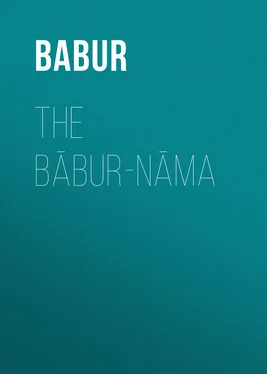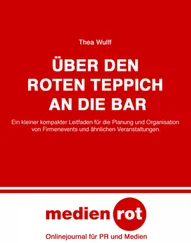Babur - The Bābur-nāma
Здесь есть возможность читать онлайн «Babur - The Bābur-nāma» — ознакомительный отрывок электронной книги совершенно бесплатно, а после прочтения отрывка купить полную версию. В некоторых случаях можно слушать аудио, скачать через торрент в формате fb2 и присутствует краткое содержание. Жанр: foreign_antique, foreign_prose, на английском языке. Описание произведения, (предисловие) а так же отзывы посетителей доступны на портале библиотеки ЛибКат.
- Название:The Bābur-nāma
- Автор:
- Жанр:
- Год:неизвестен
- ISBN:нет данных
- Рейтинг книги:4 / 5. Голосов: 1
-
Избранное:Добавить в избранное
- Отзывы:
-
Ваша оценка:
- 80
- 1
- 2
- 3
- 4
- 5
The Bābur-nāma: краткое содержание, описание и аннотация
Предлагаем к чтению аннотацию, описание, краткое содержание или предисловие (зависит от того, что написал сам автор книги «The Bābur-nāma»). Если вы не нашли необходимую информацию о книге — напишите в комментариях, мы постараемся отыскать её.
The Bābur-nāma — читать онлайн ознакомительный отрывок
Ниже представлен текст книги, разбитый по страницам. Система сохранения места последней прочитанной страницы, позволяет с удобством читать онлайн бесплатно книгу «The Bābur-nāma», без необходимости каждый раз заново искать на чём Вы остановились. Поставьте закладку, и сможете в любой момент перейти на страницу, на которой закончили чтение.
Интервал:
Закладка:
c. ‘Umar Shaikh Mīrzā’s country.
His father first gave him Kābul and, with Bābā-i-Kābulī 100for his guardian, had allowed him to set out, but recalled him from the Tamarisk Valley 101to Samarkand, on account of the Mīrzās’ Circumcision Feast. When the Feast was over, he gave him Andijān with the appropriateness that Tīmūr Beg had given Farghāna (Andijān) to his son, the elder ‘Umar Shaikh Mīrzā. This done, he sent him off with Khudāī-bīrdī Tūghchī Tīmūr-tāsh 102for his guardian.
d. His appearance and characteristics.
He was a short and stout, round-bearded and fleshy-faced person. 103He used to wear his tunic so very tight that to fasten the strings he had to draw his belly in and, if he let himself out after tying them, they often tore away. He was not choice in dress or food. He wound his turban in a fold ( dastar-pech ); all turbans were in four folds ( chār-pech ) in those days; people wore them without twisting and let the ends hang down. 104In the heats and except in his Court, he generally wore the Mughūl cap.
e. His qualities and habits.
He was a true believer ( Ḥanafī maẕhablīk ) and pure in the Faith, not neglecting the Five Prayers and, his life through, making up his Omissions. 105He read the Qur’ān very frequently and was a disciple of his Highness Khwāja ‘Ubaidu’l-lāh ( Aḥrārī ) who honoured him by visits and even called him son. His current readings 106were the two Quintets and the Mas̤nawī ; 107of histories he read chiefly the Shāh-nāma . He had a poetic nature, but no taste for composing verses. He was so just that when he heard of a caravan returning from Khitāī as overwhelmed by snow in the mountains of Eastern Andijān, 108and that of its thousand heads of houses ( awīlūq ) two only had escaped, he sent his overseers to take charge of all goods and, though no heirs were near and though he was in want himself, summoned the heirs from Khurāsān and Samarkand, and in the course of a year or two had made over to them all their property safe and sound.
He was very generous; in truth, his character rose altogether to the height of generosity. He was affable, eloquent and sweet-spoken, daring and bold. Twice out-distancing all his braves, 109he got to work with his own sword, once at the Gate of Akhsī, once at the Gate of Shāhrukhiya. A middling archer, he was strong in the fist, – not a man but fell to his blow. Through his ambition, peace was exchanged often for war, friendliness for hostility.
In his early days he was a great drinker, later on used to have a party once or twice a week. He was good company, on occasions reciting verses admirably. Towards the last he rather preferred intoxicating confects 110and, under their sway, used to lose his head. His disposition 111was amorous, and he bore many a lover’s mark. 112He played draughts a good deal, sometimes even threw the dice.
f. His battles and encounters.
He fought three ranged battles, the first with Yūnas Khān, on the Saiḥūn, north of Andijān, at the Goat-leap, 113a village so-called because near it the foot-hills so narrow the flow of the water that people say goats leap across. 114There he was beaten and made prisoner. Yūnas Khān for his part did well by him and gave him leave to go to his own district (Andijān). This fight having been at that place, the Battle of the Goat-leap became a date in those parts.
His second battle was fought on the Urūs, 115in Turkistān, with Aūzbegs returning from a raid near Samarkand. He crossed the river on the ice, gave them a good beating, separated off all their prisoners and booty and, without coveting a single thing for himself, gave everything back to its owners.
His third battle he fought with (his brother) Sl. Aḥmad Mīrzā at a place between Shāhrukhiya and Aūrā-tīpā, named Khwāṣ. 116Here he was beaten.
g. His country.
The Farghāna country his father had given him; Tāshkīnt and Sairām, his elder brother, Sl. Aḥmad Mīrzā gave, and they were in his possession for a time; Shāhrukhiya he took by a ruse and held awhile. Later on, Tāshkīnt and Shāhrukhiya passed out of his hands; there then remained the Farghāna country and Khujand, – some do not include Khujand in Farghāna, – and Aūrā-tīpā, of which the original name was Aūrūshnā and which some call Aūrūsh. In Aūrā-tīpā, at the time Sl. Aḥmad Mīrzā went to Tāshkīnt against the Mughūls, and was beaten on the Chīr 117(893AH. -1488AD.) was Ḥafiẓ Beg Dūldāī ; he made it over to ‘Umar Shaikh M. and the Mīrzā held it from that time forth.
h. His children.
Three of his sons and five of his daughters grew up. I, Z̤ahīru’d-dīn Muḥammad Bābur, 118was his eldest son; my mother was Qūtlūq-nigār Khānīm. Jahāngīr Mīrzā was his second son, two years younger than I; his mother, Fāt̤ima-sult̤ān by name, was of the Mughūl tūmān -begs. 119Nāṣir Mīrzā was his third son; his mother was an Andijānī, a mistress, 120named Umīd. He was four years younger than I.
‘Umar Shaikh Mīrzā’s eldest daughter was Khān-zāda Begīm, 121my full sister, five years older than I. The second time I took Samarkand (905AH. -1500AD.), spite of defeat at Sar-i-pul, 122I went back and held it through a five months’ siege, but as no sort of help or reinforcement came from any beg or ruler thereabouts, I left it in despair and got away; in that throneless time ( fatrat ) Khān-zāda Begīm fell 123to Muḥammad Shaibānī Khān. She had one child by him, a pleasant boy, 124named Khurram Shāh. The Balkh country was given to him; he went to God’s mercy a few years after the death of his father (916AH. -1510AD.). Khān-zāda Begīm was in Merv when Shāh Ismā‘īl ( Ṣafawī ) defeated the Aūzbegs near that town (916AH. -1510AD.); for my sake he treated her well, giving her a sufficient escort to Qūndūz where she rejoined me. We had been apart for some ten years; when Muḥammadī kūkūldāsh and I went to see her, neither she nor those about her knew us, although I spoke. They recognized us after a time.
Mihr-bānū Begīm was another daughter, Nāṣir Mīrzā’s full-sister, two years younger than I. Shahr-bānū Begīm was another, also Nāṣir Mīrzā’s full-sister, eight years younger than I. Yādgār-sult̤ān Begīm was another, her mother was a mistress, called Āghā-sult̤ān. Ruqaiya-sult̤ān Begīm was another; her mother, Makhdūm-sult̤ān Begīm, people used to call the Dark-eyed Begīm. The last-named two were born after the Mīrzā’s death. Yādgār-sult̤ān Begīm was brought up by my grandmother, Aīsān-daulat Begīm; she fell to ‘Abdu’l-lat̤īf Sl., a son of Ḥamza Sl. when Shaibānī Khān took Andijān and Akhsī (908AH. -1503AD.). She rejoined me when (917AH. -1511AD.) in Khutlān I defeated Ḥamza Sl. and other sult̤āns and took Ḥiṣār. Ruqaiya-sult̤ān Begīm fell in that same throneless time ( fatrat ) to Jānī Beg Sl. ( Aūzbeg ). By him she had one or two children who did not live. In these days of our leisure ( furṣatlār ) 125has come news that she has gone to God’s mercy.
i. His ladies and mistresses.
Qūtlūq-nigār Khānīm was the second daughter of Yūnas Khān and the eldest (half-) sister of Sl. Maḥmūd Khān and Sl. Aḥmad Khān.
( j. Interpolated account of Bābur’s mother’s family. )
Yūnas Khān descended from Chaghatāī Khān, the second son of Chīngīz Khān (as follows,) Yūnas Khān, son of Wais Khān, son of Sher-‘alī Aūghlān , son of Muḥammad Khān, son of Khiẓr Khwāja Khān, son of Tūghlūq-tīmūr Khān, son of Aīsān-būghā Khān, son of Dāwā Khān, son of Barāq Khān, son of Yīsūntawā Khān, son of Mūātūkān, son of Chaghatāī Khān, son of Chīngīz Khān.
Читать дальшеИнтервал:
Закладка:
Похожие книги на «The Bābur-nāma»
Представляем Вашему вниманию похожие книги на «The Bābur-nāma» списком для выбора. Мы отобрали схожую по названию и смыслу литературу в надежде предоставить читателям больше вариантов отыскать новые, интересные, ещё непрочитанные произведения.
Обсуждение, отзывы о книге «The Bābur-nāma» и просто собственные мнения читателей. Оставьте ваши комментарии, напишите, что Вы думаете о произведении, его смысле или главных героях. Укажите что конкретно понравилось, а что нет, и почему Вы так считаете.











